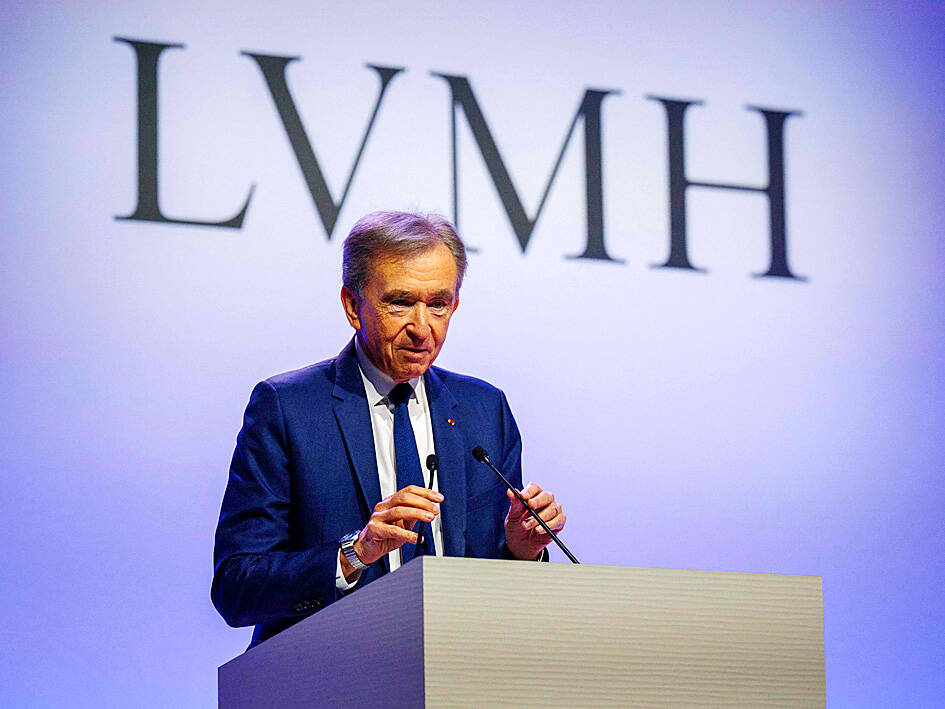LVMH Moet Hennessy Louis Vuitton SE’s sales of fashion and leather goods declined in the fourth quarter of last year, casting doubt on the prospects for a quick recovery in luxury demand.
Sales at the key unit, which includes the Louis Vuitton and Christian Dior brands, slipped 1 percent on an organic basis as wealthy holiday shoppers remained cautious.
Overall revenue at LVMH increased only 1 percent from a year earlier.

Photo: AFP
Both figures were slightly better than estimates, but disappointed investors after an upbeat report from rival Richemont earlier this month.
LVMH shares fell as much as 5.5 percent in Paris early yesterday, after rallying more than 30 percent from their low in November last year.
LVMH’s update raised concerns that the industry’s recovery from last year’s slump — caused in part by Chinese shoppers reining in high-end purchases after years of splashing out — might be slow and uneven.
Sales in the region that includes China dropped 10 percent year-on-year in the fourth quarter, the only geographic area that did not show growth.
“What I expect is to see a gradual recovery,” LVMH chief executive officer Bernard Arnault said of China during a presentation on Tuesday.
“The environment was severely impacted by COVID, then there was a strong recovery, followed by another crisis — the real-estate crisis — so it’s going to take some time,” Arnault added.
Overall, the situation globally was better in the period, but the improving trend still needs to be confirmed, LVMH chief financial officer Jean-Jacques Guiony said.
Profit at LVMH disappointed, even as the company lowered its overall marketing costs by 5 percent last year.
Recurring operating income dropped 14 percent last year to 19.6 billion euros (US$20.4 billion), missing estimates. One-time costs had an impact, including charges related to the Paris Olympic Games, Guiony said.
Still, there were signs of resilience at the luxury group. Sales at the watches and jewelry unit, which includes Tiffany and Bulgari, unexpectedly rose in the fourth quarter, more evidence that wealthy shoppers are favoring so-called hard luxury items, rather than the soft luxury of handbags and evening wear. Tiffany sales rose 9 percent year-on-year in the period.
Arnault struck an upbeat tone at the presentation.
He said this year has started relatively well, with Louis Vuitton posting double-digit growth so far this year.
Arnault also said he is confident that struggling brand Dior will make progress this year, and predicted a “booming” US market, a country he visited last week for US President Donald Trump’s inauguration.
The wine and spirits business, which has been in a slump following a pandemic-era surge, could recover in the next two years, he said. A sale of the Moet Hennessy drinks unit is not on the agenda, he added.

Semiconductor business between Taiwan and the US is a “win-win” model for both sides given the high level of complementarity, the government said yesterday responding to tariff threats from US President Donald Trump. Home to the world’s largest contract chipmaker, Taiwan Semiconductor Manufacturing Co (TSMC, 台積電), Taiwan is a key link in the global technology supply chain for companies such as Apple Inc and Nvidia Corp. Trump said on Monday he plans to impose tariffs on imported chips, pharmaceuticals and steel in an effort to get the producers to make them in the US. “Taiwan and the US semiconductor and other technology industries

CHIP WAR: Tariffs on Taiwanese chips would prompt companies to move their factories, but not necessarily to the US, unleashing a ‘global cross-sector tariff war’ US President Donald Trump would “shoot himself in the foot” if he follows through on his recent pledge to impose higher tariffs on Taiwanese and other foreign semiconductors entering the US, analysts said. Trump’s plans to raise tariffs on chips manufactured in Taiwan to as high as 100 percent would backfire, macroeconomist Henry Wu (吳嘉隆) said. He would “shoot himself in the foot,” Wu said on Saturday, as such economic measures would lead Taiwanese chip suppliers to pass on additional costs to their US clients and consumers, and ultimately cause another wave of inflation. Trump has claimed that Taiwan took up to

A start-up in Mexico is trying to help get a handle on one coastal city’s plastic waste problem by converting it into gasoline, diesel and other fuels. With less than 10 percent of the world’s plastics being recycled, Petgas’ idea is that rather than letting discarded plastic become waste, it can become productive again as fuel. Petgas developed a machine in the port city of Boca del Rio that uses pyrolysis, a thermodynamic process that heats plastics in the absence of oxygen, breaking it down to produce gasoline, diesel, kerosene, paraffin and coke. Petgas chief technology officer Carlos Parraguirre Diaz said that in

Japan intends to closely monitor the impact on its currency of US President Donald Trump’s new tariffs and is worried about the international fallout from the trade imposts, Japanese Minister of Finance Katsunobu Kato said. “We need to carefully see how the exchange rate and other factors will be affected and what form US monetary policy will take in the future,” Kato said yesterday in an interview with Fuji Television. Japan is very concerned about how the tariffs might impact the global economy, he added. Kato spoke as nations and firms brace for potential repercussions after Trump unleashed the first salvo of